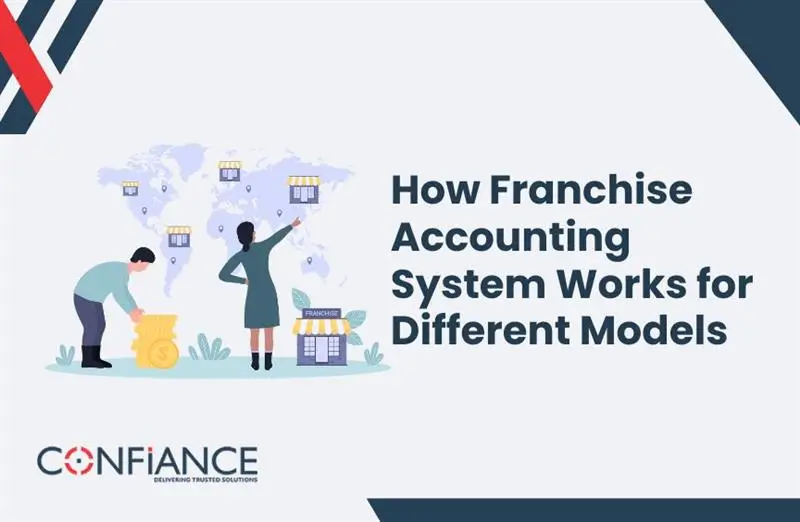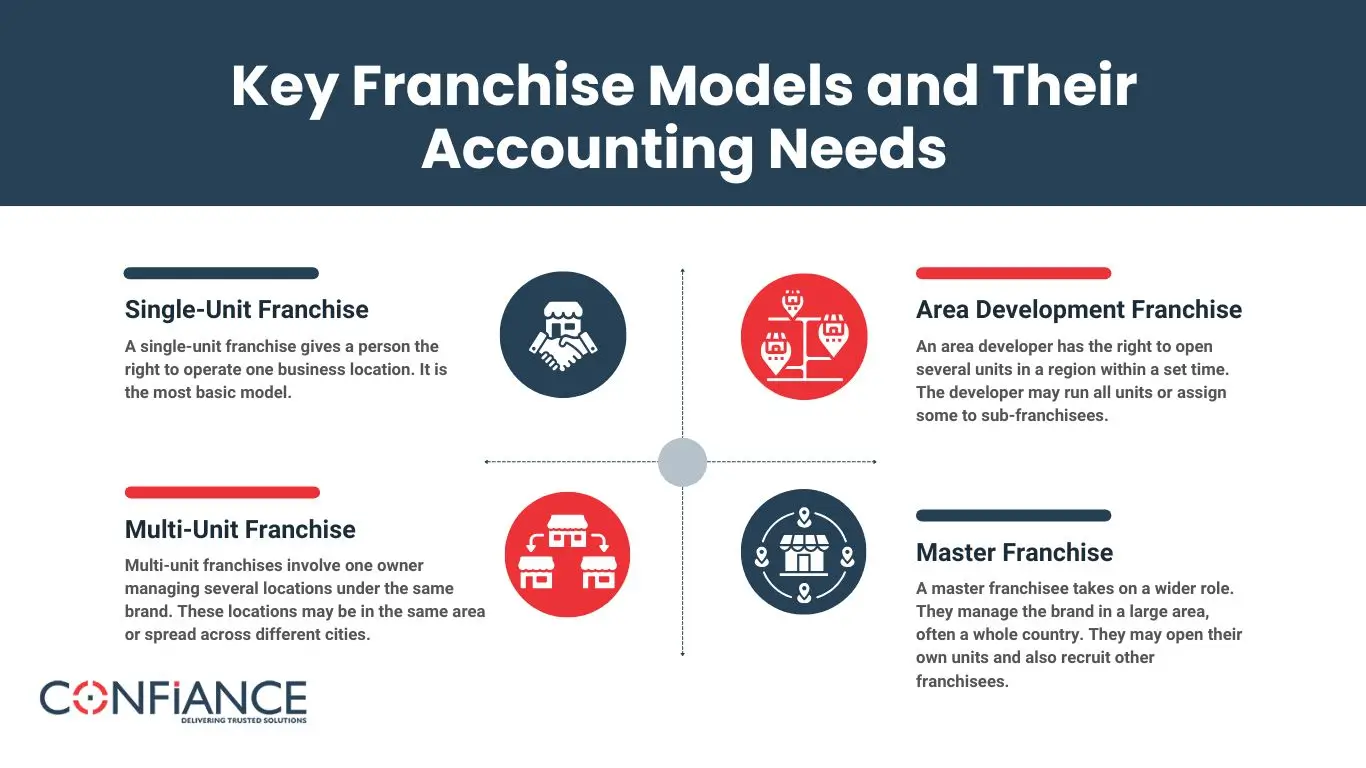
How Franchise Accounting System Works for Different Models
A franchise accounting system helps both franchisors and franchisees keep track of money, performance, and business operations. It supports different models, each with its own needs and setup. Whether a business is product-based or service-focused, the right accounting structure ensures clear records, better decisions, and fewer mistakes.
This blog explains how a franchise accounting system works across various franchise models. It covers key functions, differences in structure, and why choosing the right system matters.
What is a Franchise Accounting System?
is a structured process for recording income, expenses, fees, and royalties within a franchise setup. It connects financial data from each unit to the franchisor, ensuring uniformity and control. The system can be part of a full platform or integrated with tools like payroll software, point-of-sale systems, and inventory trackers. It also tracks franchise fees, which can vary by model and agreement terms.
This system handles regular financial tasks like:
- Tracking royalties
- Managing advertising fees
- Monitoring unit performance
- Handling cost sharing between units
- Preparing reports for compliance and taxes
These functions vary based on the franchise model.
Key Franchise Models and Their Accounting Needs

1. Single-Unit Franchise
A single-unit franchise gives a person the right to operate one business location. It is the most basic model.
Accounting Focus:
- Daily sales and expenses
- Local payroll
- Monthly royalty payments
- Advertising fee contributions
In this model, the system tracks one unit’s income and costs. It simplifies reporting and helps compare actual performance to expected results. Since operations are on a smaller scale, many franchisees use cloud-based accounting tools with dashboards that show sales, expenses, and payroll in real-time.
2. Multi-Unit Franchise
Multi-unit franchises involve one owner managing several locations under the same brand. These may operate in the same area or across cities as multiple franchise locations. Each franchise owner needs visibility into both individual unit performance and total business health.
Accounting Focus:
- Separate books for each unit
- Consolidated reports for the owner
- Payroll across multiple sites
- Tracking internal transfers or shared costs
A system for multi-unit setups must offer both detailed and high-level views. Each unit needs its own profit and loss reports. At the same time, the owner must see combined reports for budgeting, tax planning, and cash flow control. This often requires integration with payroll and HR systems for better staff cost management.
3. Area Development Franchise
An area developer has the right to open several units in a region within a set time. The developer may run all units or assign some to sub-franchisees.
Accounting Focus:
- Development costs
- Tracking build-out expenses
- Multiple income sources from operated and assigned units
- Reporting to the franchisor on progress and sales
The franchise accounting system in this case handles both direct operations and oversight roles. Developers collect and pay fees, manage unit growth, and follow regional targets. The system must track royalties received and paid, construction costs, and territory-based expenses.
4. Master Franchise
A master franchisee takes on a wider role. They manage the brand in a large area, often a whole country. They may open their own units and also recruit other franchisees. The system must handle multiple layers within a franchise network, from sub-franchisees to the master operator.
Accounting Focus:
- Complex fee structures
- Sub-franchise income and expenses
- Royalty sharing with the franchisor
- Cross-border accounting (for international franchises)
This model needs a detailed franchise accounting system with multi-entity and multi-currency features. It tracks money across different layers. The master franchisee earns from sub-franchisees while paying a portion to the main franchisor. The system must also support tax compliance in each region.
Core Features of a Franchise Accounting System
Though the models differ, most franchise accounting systems share some basic features. These include:
1. Standardized Chart of Accounts
A chart of accounts helps organize every type of transaction. It makes sure each unit records data in the same way. This allows for easy comparison and reporting. A chart of accounts helps organize every type of transaction, ensuring consistency across all franchise units.
2. Royalty Tracking
Royalties are often a set percentage of sales. The system must pull real sales data, apply the right percentage, and track payments. Some systems connect to point-of-sale tools for automatic updates.
3. Ad Fund Accounting
Many franchisors run brand-wide ad campaigns. Units contribute a fee for this. The system tracks who paid what, where the money went, and what results came from the spending.
4. Performance Dashboards
A good system shows clear dashboards with key metrics like revenue, profit margins, and costs. These help both franchisors and franchisees spot problems and track goals. These dashboards help track financial performance using metrics like revenue, profit, and cost trends.
5. Compliance and Tax Reporting
Different states and countries have unique tax rules. A franchise accounting system helps stay compliant by generating reports for local and federal authorities.
6. Integration with Other Tools
Franchises often use multiple systems. A strong accounting setup works well with tools for inventory, payroll, billing, and customer data.
Benefits of Using the Right Franchise Accounting System
A clear and accurate accounting system supports business growth. Here are a few direct benefits:
- Less manual work: Automation reduces the need to enter data by hand.
- Fewer errors: Mistakes in royalty payments or tax filings can cost money and time.
- Better planning: Financial reports help with cash flow control and budget setting.
- Improved trust: Franchisees and franchisors both benefit from clear records.
- Growth support: As more units open, the system can handle higher volumes and complexity.
Choosing the Right Franchise Accounting System
When picking a system, consider these points:
- Scalability: Will it still work if you add 10 or 100 more units?
- User Access: Can different users get what they need without seeing what they shouldn’t?
- Data Security: Are financial details safe and backed up?
- Customization: Can you add fields or reports to suit your business?
- Support: Is help available when problems come up?
Test systems with a pilot unit before full setup. Ask other franchises what works for them. Review costs not just for software, but also for setup, training, and upgrades. A franchise accounting system is not just a back-office tool. It is part of the franchise’s core operations. When done right, it supports growth, builds trust, and keeps finances clear across different models.
From single-unit franchises to master franchises, each structure has unique needs. A good system adapts without losing clarity. Standard features like royalty tracking, ad fund management, and reporting help everyone stay on track. Whether you are starting or expanding a franchise business, having the right accounting setup is key to smooth operations. At Confiance, franchise accounting services have been our core expertise. Contact us now if you need help with choosing the best franchise accounting system for your model.
Summary
- A franchise accounting system tracks income, expenses, royalties, and fees across all franchise units.
- It ensures accurate records, supports better planning, and reduces errors for both franchisors and franchisees.
- Single-unit franchises need simple tools to manage one location’s sales, payroll, and royalty payments.
- Multi-unit franchises require reports for each site plus combined reports for budgeting and cash flow.
- Area developers need to track unit growth, development costs, and income from sub-franchisees.
- Master franchises need advanced systems to manage complex fees, royalty sharing, and multi-region taxes.
- Key features include standard accounts, royalty tracking, ad fund accounting, tax reporting, and dashboards.
- The right system should be secure, scalable, easy to use, and able to integrate with tools like payroll or inventory.
FAQs
- What is a franchise accounting system?
It is a system that tracks income, expenses, royalties, and fees for franchise units. It connects financial data from each unit to the franchisor. - How does franchise accounting work for different models?
Each model has different needs. A single-unit tracks one location. A multi-unit tracks each site and combines reports. Master and area models add more layers like sub-franchise income and shared fees. - What is royalty tracking in the franchise accounting software?
Franchisees pay royalties based on sales. The system calculates the right amount and records payments to avoid mistakes. - What should a franchise accounting system include?
It should have standard accounts, royalty tracking, dashboards, tax reports, and work with payroll and sales tools. - How can I pick the right system?
Choose one that fits your size, keeps data safe, allows access by role, and works with other tools. Try it on one unit first.
